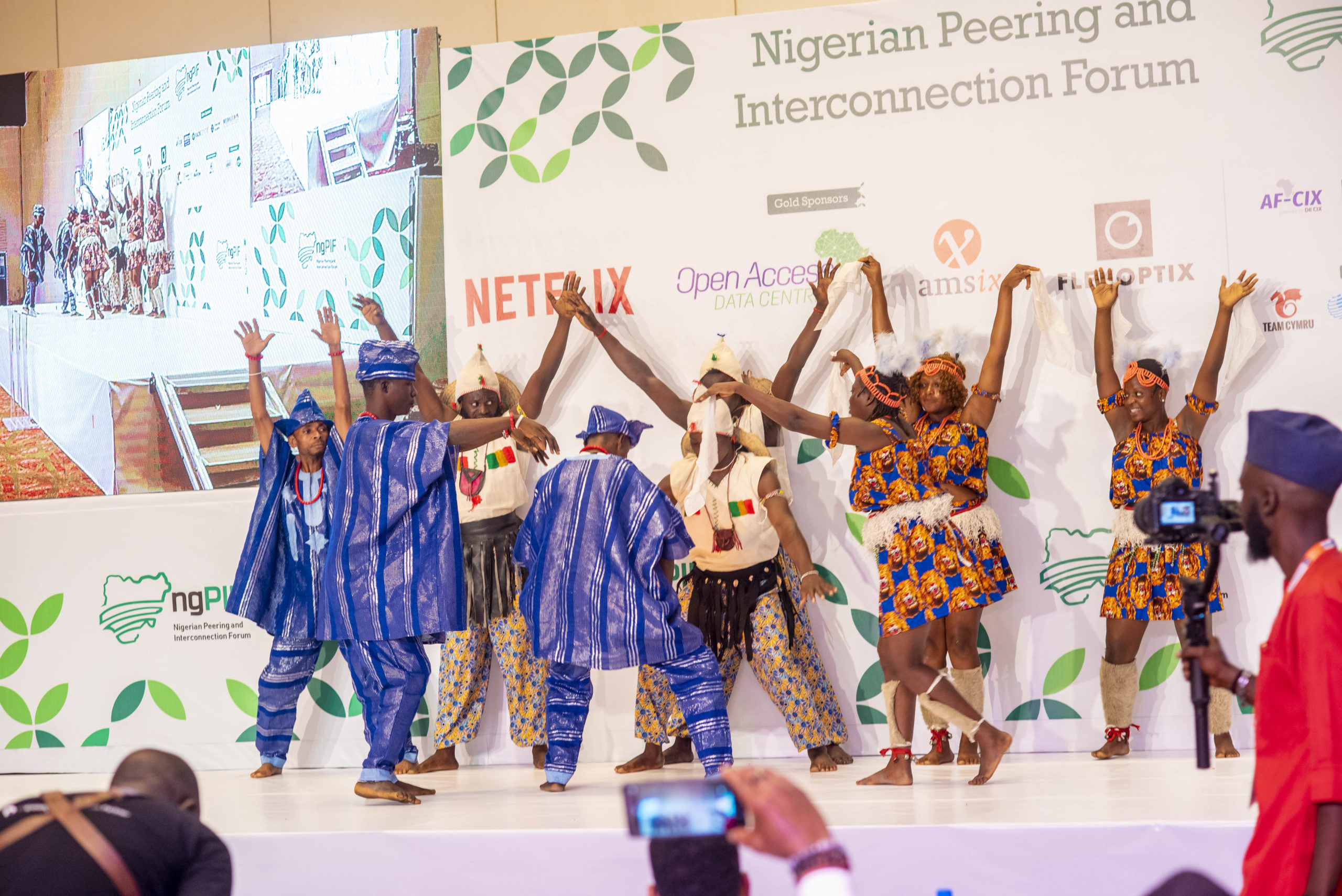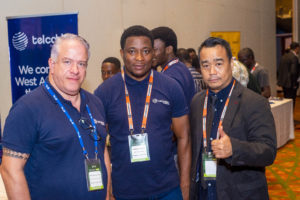The Nigerian Peering and Interconnection Forum’s annual session, organized by NgNog and IXPN commenced at Eko Hotel and Towers in Victoria Island, Lagos, on October 25, 2023. The event featured insightful discussions on various aspects of internet infrastructure and connectivity in Africa.
In a dynamic presentation that unfolded into Africa’s digital future, Obinna Adumike, the Project Coordinator of AF-CIX took the stage to dissect the state of the continent’s internet landscape. With a narrative finesse, he painted a vivid picture of Africa’s cyber prospects.
Obinna Adumike’s captivating presentation unveiled a promising digital future for Africa. He highlighted the growth of cloud data centers, extensive deployment of edge services, and the rising popularity of 100-gigabit connections. Africa’s internet traffic patterns are undergoing a transformation, favoring local data exchange. Robust IP capacities were celebrated, with Nigeria’s growth on the horizon.
Obinna explored the dynamics of pricing and capacity, emphasizing the importance of internet exchanges. He also addressed the challenges of deploying submarine cables and praised significant data centers in South and West Africa. The impact of population size on internet penetration, with Nigeria’s 4G growth and Mali’s potential, added depth to the narrative. Finally, the presentation offered a glimpse of future trends, heralding increased competition in internet interconnection and peering and the arrival of new submarine cables. Africa’s digital renaissance is underway.
Joshua Joshua, the Operations Manager of Access and Content Limited, came on stage as the next speaker. He began by sharing that Nigeria’s internet penetration currently stood at 45.57%, leaving the audience intrigued about potential growth on the horizon. He highlighted the abundance of digital resources in Nigeria, boasting 257 Autonomous System Numbers (ASNs) and AFRINIC-registered IP addresses. However, Joshua pointed out a slow adoption of IPv6, possibly influenced by misconceptions.
The narrative then took a fascinating turn, delving into the world of Nigeria’s Internet Exchange Points (IXPs), with a spotlight on Lagos, a thriving epicenter housing over 200 active networks. While it was evident that Lagos held the lion’s share of network activity, concerns emerged regarding the country’s internet traffic capacity and the necessity for networks to collaborate more effectively in sharing data.
Joshua’s presentation also uncovered intriguing statistics about Nigeria’s mobile landscape, featuring over 220 million mobile lines and a growing shift towards fiber-based internet services. While Nigeria could boast an impressive upload speed, Joshua hinted at the need for improvements in download speeds and latency. In a regional face-off against South Africa and Kenya, Nigeria excelled in upload speed but lagged behind in other areas.
The narrative reached its zenith, shedding light on the potential for Nigeria’s digital transformation, especially in the realm of fiber-based solutions and the significant role played by data centers. The story was enriched by the presence of 247 licensed ISPs, each contributing to the nation’s evolving digital landscape.
A thought-provoking Q&A session was orchestrated by Mr. Dewole Ajao of Google, where the intricacies of internet traffic bypassing local exchange points in cities like Abuja in favor of Lagos were discussed. Mr. Muhammed Rudman, the CEO of IXPN, eloquently clarified the rationale behind this phenomenon.
In the end, the session masterfully painted a vibrant and promising picture of Nigeria’s digital landscape, poised for growth and transformation in the digital era.
Oluwasayo Oshadami, GM of Technical Solutions and Managed Networks, Mainone, discussed the need to improve interconnection and reduce internet traffic to Europe in Nigeria. He emphasized the role of data centers, praised the Internet Exchange of Nigeria (IXPN), and highlighted Mainone’s infrastructure, which offers com intertwining the day’s experiences into a cohesive narrative of comprehensive networking solutions in Lagos.
At a conference, attendees took a coffee break before Dr. Ayotunde Coker’s keynote speech. He highlighted Lagos, Nigeria, as the emerging data center hub in Africa due to improved connectivity, lower latency, and growing demand for cloud and AI services. Dr. Coker stressed the need for continent-wide data regulations and hinted at potential hubs in Kenya, Morocco, and Egypt. The story’s punchline: Lagos is set to lead in data center capacity, especially for cloud and AI, alongside South Africa.
The opening ceremony showcased a vibrant cultural edutainment and a brief welcome speech was given by Dr. Adewale Adedokun, the coordinator of NgNOG, and Mr Muhammed Rudman, CEO of Internet Exchange Point of Nigeria (IXPN), and Engr Ubale Ahmed EC, Technical Services, NCC.
In a lively presentation, Wouter Esing of Meta discussed internet growth in West Africa. He urged the swift entry of content providers into the region to break the high-cost, low-demand cycle. His solution? A cooperative approach, with South African content providers expanding into West Africa, ultimately leading to more local content for all. The key takeaway: collaboration is essential for boosting connectivity and driving economic growth in West Africa.
Salam Yamout’s report delves into the world of Netflix Open Connect. With a global reach spanning 190 countries and 230 million subscribers, Netflix’s commitment to local content, especially in African nations, is clear.
The report highlights Netflix’s Open Connect, a content distribution network that ensures efficient streaming at just four megabits per second. Netflix’s global cache deployment and partnerships with Internet Exchange Points help local networks and reduce ISP costs.
The report also introduces Routerless IX as a means to make local content more accessible, with options for ISPs to offset cache-filling costs through donations and grants.
A smart traffic steering algorithm ensures efficient content delivery. Salam Yamout’s report underscores the significance of efficient, cost-effective, and high-quality streaming through local caches and IXP partnerships, showcasing Netflix’s commitment to global content excellence.
In “Interconnecting Realities” by Ben Ryall of Meta, the session explored their extensive network architecture, spanning from core data centers to metro areas, collaborating with ISPs and operators. They emphasized the shift from text to immersive experiences, with varying latency and bandwidth needs. Data-driven decisions and metrics are crucial for network optimization. The presentation also highlighted efforts to expand their presence in Nigeria, create new peering markets, and promote active-active connectivity for enhanced network resilience. The ultimate goal is to maintain traffic within the country during failures and efficiently serve local users. Future plans involve establishing new landing points and data centers in areas like Port Harcourt and Abuja to bolster Nigeria’s digital ecosystem.
As the curtains fell on Day 1, a new scene was set for the pivotal “Peering Personals” session. In this act, companies such as IXPN, Meta, Google, AFCIX and AMSIX took center stage. With a flourish, they introduced themselves and shared their contact details, sparking the flames of collaboration within the ISP community.
Amid this technological symphony, Joshua Joshua took the stage to intertwine the day’s experiences into a cohesive narrative with genuine appreciation for the speakers’ contributions, he painted an enticing preview of what Day 2 had in store. But his words weren’t just about what lay ahead; they were an invitation to the audience. He urged them not just to absorb knowledge but to forge connections and build a sense of community. The event’s true purpose came into focus – it was not only a place of learning but a forum for unity and fortification, a stronghold for the ever-evolving internet landscape.
Day 1 had unfolded like a thrilling chapter in the narrative of Nigeria’s internet journey. The atmosphere buzzed with excitement, whispering of the nation’s potential to dazzle on the African stage. The stage was set, and Day 2 promised to take this remarkable session even further, with new revelations and connections on the horizon.

